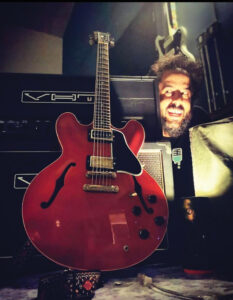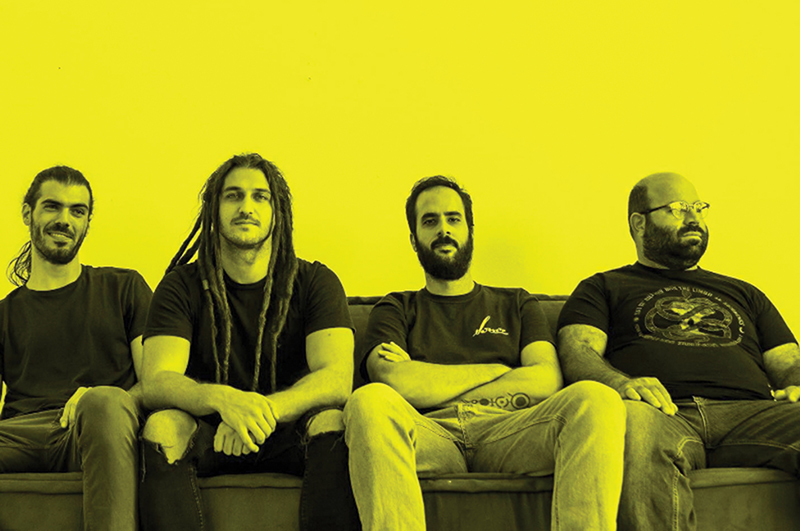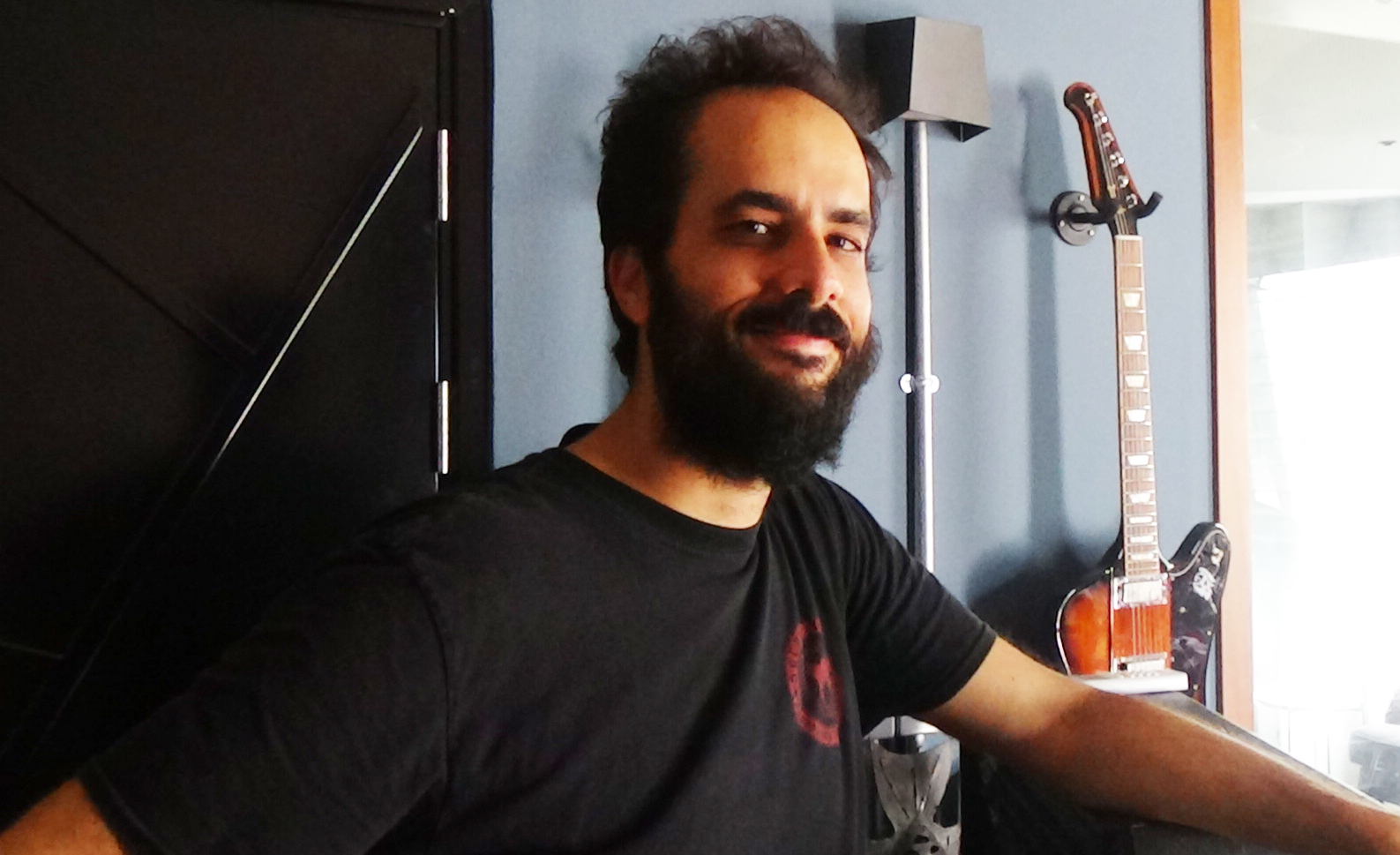In a reluctant frontman, THEO PANAYIDES finds a sometimes-angry guy for whom music is the drug
You might think 36 is a fine age to be; for a rock musician, though, it’s quite advanced – and of course one can also “overthink” things, says Andreas Matheou, speaking in the control room of his home studio (not really a studio, more of a rehearsal space) on the outskirts of Larnaca.
“I mean, I was talking with Julien just before you came,” he says – ‘Julien’ being Julien Koukkides, the drummer in Abettor, one of four bands of which Andreas is a member – “and I found out about a drummer who’s my age that also plays saxophone, he’s a producer, he’s a multi-instrumentalist, and he already has a huge name in the underground jazz scene. ‘And he’s our age!’ I was telling Julien, and I was like…” He sighs deeply and extravagantly: “It’s a motivation thing. Sometimes it can be motivating, and sometimes it can be ‘OK, fuck this, what am I doing with my life?’.”
Andreas is “direct”, it’s among his most endearing traits – a tall, bearded guy with a mischievous air and a tendency to cut to the chase. I didn’t know much going in, except that The Ladderman – his main band, the one where he’s also the frontman and writes the lyrics – have a new album, Figures on Demand, coming out in the autumn, but he’s also open and upfront about his road rage, for instance (he even wrote a song about it), or his frequent doubts about trying to make it as a musician in Cyprus, or the fact that he tends to lose his temper, especially where music is concerned.

“Not towards us,” laughs Manolis. “Towards himself, mostly.”
So I can say he’s a perfectionist, I suggest diplomatically.
“Ehhh, okay,” intervenes the man himself. “A lot of people like that word: ‘What’s your biggest flaw?’ ‘Oh, I’m such a perfectionist’.” He shakes his head. “No. I’m an angry guy sometimes and I need to work on that, but okay: it is what it is.”
That’s another repeated motif, the phrase of a man who does indeed tend to “overthink” things, and needs a way to cut short those endless conversations with himself: ‘It is what it is’. His banter with the audience is legendary among Ladderman fans, but he says he mostly does it to minimise the awkwardness of being onstage between songs: “Sometimes I say stupid things – some people find it funny, some people don’t. It is what it is”. Then there’s the prickly subject of his unlucky generation, who got caught in the burst-bubble quagmire after the boom of the post-invasion years. Financial crisis came when Andreas and his peers were barely in their 20s, and never really left. It does seem like they got collectively screwed by the system, I venture.
“That’s what I tell my parents, actually: ‘You screwed us! It was your fault!’.” He chuckles grimly, with the air of someone who’s exaggerating for effect rather than joking per se. “But it’s okay, they didn’t know better… The people who were responsible should’ve known, of course – that’s what I keep ranting in my songs, as well. But it is what it is.”
He sighs again, looking troubled: “I try not to think about that stuff, because now I have a kid as well.” (He and his wife Agni have an 18-month-old son.) “As a musician I try not to overthink stuff, because then you basically end up in a loop and you don’t do anything – you just say ‘OK, I’m going to work to make some money, and that’s life’. But no, that’s not life! That shouldn’t be life. Like, working, making money and just waiting to die?”
These are hard questions, and they gnaw at him even now. He tried to go the usual route, but it didn’t take: one of those generic university courses, in the UK. “Public Relations – and Politics?” he frowns, trying to recall. “No, International Relations! I don’t even remember”. He lasted a year – a very depressed year, so depressed he didn’t even play music – then came back and announced he was done with uni, much to the dismay of his very mainstream parents (his mum was a teacher, his dad a civil servant who later worked for the British bases). Andreas had been in bands since his teens, though not in any structured or especially inspired way: “We played shitty music with shitty sound – but I mean, it’s a rite of passage. You have to do that”. At 16 he’d seen a friend playing Metallica’s ‘Master of Puppets’ and thought it was cool (to be fair, it kind of was), so he exchanged his acoustic guitar for an electric, started learning songs and got into bands. Was there no plan for the future?
“No, of course not! No, no, no… There was a lot of smoking” – tobacco, incidentally, not weed; he’s never been into the illegal stuff – “lots of friends, had a good time, but no plan whatsoever. No plan.”
What else was he good at, apart from music?
Extremely long pause. “I don’t know… Being tall?”
Andreas drifted for a while, till his early 20s. Music didn’t seem like a viable option, though he did get a job in a music shop. He’s actually been lucky with his day jobs, insofar as they’ve always been music-related – mostly teaching though also, for the past few years, working as a recording engineer at Hot Soap Studios in Larnaca. Agni (who’s an architect) had a hand in that, having happened to meet the Jordanian owner through her work – and Agni’s actually been the one constant in his life since those early 20s, Andreas crediting his wife’s support and understanding for helping him find his way. They met 12 years ago; a year later, in 2011, he formed The Ladderman (specialising in a kind of alternative heavy rock), two years later came Abettor, then The Smallest Creature, then Nabuma – though his role varies, guitar and backing vocals in Abettor and Creature, playing bass in Nabuma (which is more of a soul/R&B band) and collaborating with singer/songwriter Nicole Ardanitou. He played all three nights of the Fengaros festival last month, every night with a different band.
Andreas Matheou is a somewhat reluctant frontman. He’s more of a musician’s musician, an all-rounder – and even his personal style isn’t brash and loud like a frontman’s, more sardonic and cheeky. He tends to be the joker in a group of friends (it depends on the group, of course); “I tease people a lot. I like people teasing me, as well”. He tends to externalise emotion – hence the road rage – but also lives in his head a lot, hence the overthinking. “I have social skills, but I wouldn’t say I’m an extrovert”. He never used to socialise much, even before he became a dad (most nights are spent playing music and rehearsing anyway), and of course the kid has changed everything. ‘What’s your plan for fatherhood?’ I ask later, when we’re in the studio. What kind of values would he like to instil in the boy?
“My plan is not to make him an asshole,” he replies lightly. “To be a healthy human being. Be kind to others, I guess.”
“And hopefully a drummer,” adds Manolis.

Frustration with society, to a certain extent – the whole sorry deal handed down to Millennials, the corruption that seems so endemic in Cyprus. “I’m not political at all,” claims Andreas – yet in fact there are three songs on the new album touching on the ‘golden passports’ scandal from a couple of years ago. (‘Not political’ just means they’re all as bad as each other, basically.) Professional frustration too, of course. How much further, after all, can Andreas go here? Fengaros is the biggest music festival on the island; he played three times this year, and again in previous years. All four of his bands are established; the upcoming album will be The Ladderman’s third. This is partly what makes him “difficult” in rehearsals and recording sessions – a certain sense of always having to fight against complacency, the fear of settling, the “standards that I feel the need to follow. Because if we follow the Cyprus standard – ‘Ah, it’s good enough, for Cyprus’ – this is my enemy. No. I hate that.”
Have they managed to become well-known outside Cyprus?
“Eh, we’ve – ” begins Andreas – then abruptly stops, as if mindful of his reputation for being a straight talker. “No. In a few words, no… One word, actually.” Making music has become easier in recent years, but getting it known – even getting it heard – has become even harder. Record companies won’t listen to unsolicited songs; there’s just too much out there. Touring live is the best solution, but it’s hard when you live on a small island (the band tried to organise a couple of gigs in Greece, but were defeated by logistics issues); otherwise you just have to pay someone to “pitch” your music online – to pester people, basically, to hustle and beg.
“It’s like a full-time job,” explains Andreas – “and that’s where I give up a bit, to be honest. I write the songs, I produce them, I mix them, I’m in so many bands, I play – but, when it comes time to go and do this kind of work, I’m like ‘Guys, I’m sorry, I’m a bit burned. I need someone else to do it’.”
He has no time, of course – but it’s also, I suspect, the kind of work he’d find distasteful. It goes against his temperament, his eternal preference for honesty (manifested in being too direct sometimes, even angry) – and it also, in a way, degrades the music, turning it into a product. Having a child has been life-changing, says Andreas – but he needs to keep making music too, not even parenthood can change that. If he doesn’t play for a couple of weeks, “I get antsy, I get frustrated”. Music is his drug, his therapy; even just listening, “I get goosebumps while listening to music” – not once in a while but all the time, “it might be a daily thing”. He once read a piece about people who get goosebumps from music – and apparently “they have some senses heightened, their brain works a bit differently”. Sounds about right.
Music (like him) is direct, it goes right to our pleasure centres. Andreas Matheou does it for pleasure, in a way – it’s certainly not for the money – but he’s also an artist, and artists crave recognition; you can’t carry on motivating yourself forever, especially at the ripe old age of 36. Sometimes he thinks of music as his legacy – then berates himself for being so pretentious. How can playing a guitar and writing a handful of tunes count as a legacy, he laments in his darker moments – “but then that’s the overthinking part again, so I say: ‘OK man, stop! At least you’re doing something. You have good friends. You have your health. You have bands, you do music. You have a family… It’s good!”. More importantly, it is what it is.







Click here to change your cookie preferences